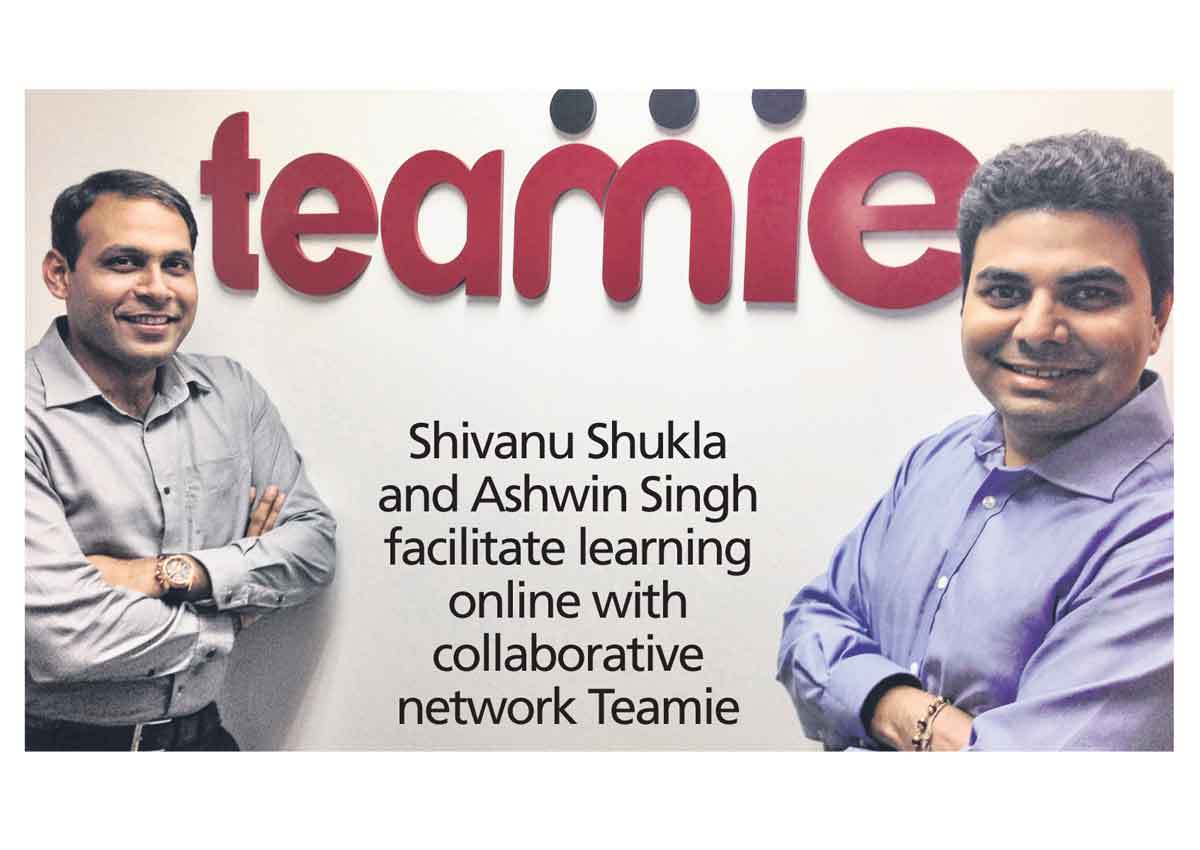ASPIRING entrepreneurs Shivanu Shukla and Ashwin Singh had toyed with the idea of starting an Indian restaurant while they were working at consulting firm Frost & Sullivan in Shaw Towers, where many people throng to watch Bollywood movies.
But as they were talking about their plan, someone had already started the restaurant.
The duo, who had the desire to start their own company, then explored other opportunities and decided to be more decisive with executing their ideas.
In 2009, Mr Shukla, an associate director at Frost & Sullivan, was working on a consulting assignment that centred around enterprise social networks, their feasibility and impact.
“We were discussing whether a private social network for an enterprise would work.
So it’s essentially taking a facebook-like solution and applying it within a company,” said Mr Shukla.
It made him think deeply about the idea of social networks for enterprises and the industries which such networks could be of use.
One of the sectors he looked at was education.
“I researched more about the education sector to understand what is the landscape like, why do classrooms still look like what it was 20 years ago and why is it resisting change,” said Mr Shukla.
This, he said, formed the basis for product development when he and Mr Singh saw a “genuine gap”.
Mr Shukla explained that current learning management systems in the market are transactional.
They allow teachers to upload their slides and students to upload word file assignments which teachers will assess.
“You can do that with a dropbox folder. You don’t need an expensive learning management system for that,” he added.
The 33-year-old’s vision was that a learning system online should not just be about accessing content and managing learning.
Instead, it should facilitate learning, enable students to ask questions and allow teachers and students to discuss about what they are learning, said Mr Shukla, who came to Singapore from Kanpur in 2001 on a Singapore Airlines-Neptune Orient Lines scholarship to do his degree in electrical engineering at the National University of Singapore.
His co-founder, Mr Singh, came to Singapore from Delhi in 2006 to do his master of business administration at SP Jain School of Global Management.
This time, he and Mr Singh, 36, decided to be decisive.
They left their jobs in 2011 to start Teamie – a cloud-based collaborative learning network that allows educators and students to interact in a fun way.
Before incorporating the company, they invested time and money to build a product prototype.
They also pitched the idea of a social collaborative learning platform to friends and angel investors and received some funding.
The founders, who are permanent residents here, also spoke to students, teachers and lecturers in schools and universities in Singapore, Malaysia and India to understand their needs and pain points.
With their research, they created a social network-like workspace with lessons and assignments that teachers can post in their virtual classrooms.
It mimics the school experience by providing features like online classrooms, study groups, bulletin boards and locker rooms.
On Teamie, users can share a thought or ask a question.
The function allows teachers and students to look at the important questions in class, and start their discussions. The platform allows teachers and students to comment on the attached documents, and leave their feedback.
Mr Shukla said this is a handy function when students are working together on group projects, or when teachers are marking an essay type question online.
Teamie is not just about work. It also has gamification elements built into the platform that reward positive behaviour through points and badges.
It is designed to encourage users to share content, ask questions, answer questions and take academic lessons or submit their assignments on time.
The start-up’s clients include United World College South East Asia, St Joseph’s Institution International School, international educational foundation International Baccalaureate, Uniteam Training and more in countries such as Malaysia, China, the US and UK.
It has served about 500,000 users since its founding.
In fact, a report by Ovum, a business intelligence firm specialising in telecommunications, media and technology, ranked the firm a market challenger in the area of online learning platforms, alongside competitors Jenzaba and Moodle.
Teamie, which has offices in Singapore and Delhi, offers its collaborative learning network as a monthly or yearly subscription service. It costs about $2 to $3 per user per month.
But “if the client registers more users with us, we will lower the per user fee”, said Mr Shukla.
“We believe that we learn better when we learn together.
Social platforms have become the de-facto mode of communication, and together with smartphones and cloud computing, they have changed how we live, work, play and learn,” he added.

Get a copy of tabla! for more stories.







